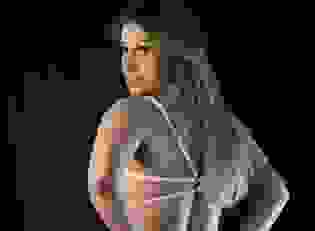Note: You can change font size, font face, and turn on dark mode by clicking the "A" icon tab in the Story Info Box.
You can temporarily switch back to a Classic Literotica® experience during our ongoing public Beta testing. Please consider leaving feedback on issues you experience or suggest improvements.
Click hereAmos picked up the pace of his stroll. He raised his gloved right hand to shield his face from the gusting northerly wind. His eyes were transfixed on the Lincoln Memorial, which lay several hundred yards ahead. His inner conversation continued: "The cohort life expectancies at birth -- using updated actual experience from our massive database -- keep on climbing, just like they've been projected to do for years. But the cohort life expectancies at age 65 -- again using updated actual experience -- have stopped climbing, and even dropped a little in recent years. Couldn't Hugh see there's no mathematical doubt that payroll tax increases and benefit reductions are no longer needed?"
Amos strode more briskly toward the monument that he had set in his sights. As he finished climbing the myriad of steps, he felt the protection of the Memorial's northern wall from the gusting wind. He walked almost reverently to the feet of the giant statue.
"Ol' Abe," he whispered aloud. "Even as good a man as you took almost two whole years to work up the nerve to do what was right. You could've signed the Emancipation Proclamation right after the war started, without tryin' to build up a consensus."
Amos froze in his tracks, as much a statue as the giant form in front him. "Do what was right," his thoughts repeated. A shadowy picture began to emerge from the mental haze that enveloped him. "Life expectancies at birth: rising; life expectancies at age 65: declining." Amos' epiphany wrestled to free itself from the recesses of his mind. "That means the distribution of deaths is being pushed later at the younger end, and pushed earlier at the older end -- compression of the distribution!"
The throttle on Amos' brain was now at full tilt. "What would explain such a phenomenon?" he questioned audibly. "Better medical technology, healthier lifestyles, and the final arrival of universal health care availability in 2011 -- all those factors help to explain the mortality improvements at the front end of the distribution. But what could explain the deterioration at the back end? AIDS, increasing engagement in extreme sports, and sedentary lifestyles don't describe what we've witnessed in the older generation in recent years."
A montage from Amos' recurring dream passed through his consciousness, stirring multiple senses. From the steps just outside the monument where he now stood, he could hear Dr. King declare from the past, "I have a dream that one day this nation will rise up and live out the true meaning of its creed: 'We hold these truths to be self-evident: that all men are created equal." He could see Thomas Jefferson fine-tuning his Declaration of Independence to include the additional truth "...that they are endowed by their Creator with certain unalienable Rights; that among these are Life, Liberty and the pursuit of Happiness..." He could smell the sheep dung on the feet of the prophet Amos as he called down divine retribution on the nations that committed atrocities against the weak and defenseless: "For three transgressions... and for four..."
"Dear Lord," he prayed aloud, "I know you're showin' me somethin'. Your word tells me to trust in You with all my heart, and lean not on my own understandin'; and in all my ways acknowledge You, and You will direct my paths. I'm leanin' on you for understandin', Lord." A glimpse of his mother's troubled face, suddenly devoid of the mirth that had been so evident as she lay in her hospital bed, imprinted itself in Amos' mind. His words that had elicited her response returned to him from some dozen years distant: "It was about that same time that you started comin' up with all that nonsense about your friends at the nursing home dyin' suspiciously."
"Oh... my... God!" Amos bellowed, seemingly from his bowels, as he realized the enormity of his revelation. His breathing became labored and his pulse raced. His roiling stomach threatened to leave his not-yet-digested breakfast at Lincoln's feet. "The government... couldn't make the Social Security system work on benefit reductions, revenue increases, and alternative forms of investment..." He remembered with disdain playing an on-line "Social Security Game" that had been sponsored by the American Academy of Actuaries, posing these three alternatives for dealing with the Social Security under-funding problem, in his early days at OCACT. The aging of the Baby Boom generation, the pay-as-you go structure of the system, the shortfall in the SSA trust fund, the Congressional reluctance to increase payroll taxes -- they had all been solved with an ingenious yet dastardly response: the covert and systematic elimination of infirm elderly Social Security recipients.
Amos knew from his early indoctrination as an actuary that "the work of science is to substitute facts for appearances and demonstrations for impressions." He was reluctant to jump to conclusions. He resisted the notion that his own government, or some renegade faction thereof, could sponsor such an atrocity. But in his heart of hearts, he knew that it was true.
Envisioning his father Walter entering the mental montage with his mother Bonita, the prophet Amos, Thomas Jefferson, Dr. King, and Ol' Abe, Amos recalled the opening words of one of the later chapters in the New Testament book of Hebrews: "Therefore, since we have so great a cloud of witnesses surrounding us... let us run with endurance the race that is set before us..." As he pondered those words, he could hear his Scottish friend's dying words echoing from within the memorial walls: "Help... them..."
* * * * *
"Proof. Irrefutable evidence -- that's what I need," Amos murmured angrily to himself. Two weeks of searching Social Security databases and Library of Congress records had yielded little more than subtle hints and statistical subterfuge. A sparse few Internet articles blared accusations against governments sanctioning the elimination of the elderly, but their impact vanished amid the multitude of quack-variety conspiracy theories that accompanied them. None provided a shred of credible evidence.
Amos felt his anger rising from a simmer to a seethe as he reflected on his frustrating quest. "Anger's always a red flag," he could hear Walter's homily to his impressionable young son, "it tells you somethin' needs fixin' -- fix your perception, or fix the injustice." If Amos was right about what was going on, there was a serious injustice to fix. If he was wrong, his perceptions seemed to indicate that he'd developed paranoia in his advancing middle age.
The fact that he felt he could trust no other person to help on his quest made him wonder seriously whether he was indeed paranoid. "This is big -- really big! It would take a massive effort, no matter how covert. There's no tellin' who'd have to be involved. I just can't take any chances," he thought despondently.
Amos adjusted the fluorescent lamp that rested on his cherry veneer office desk. He needed some illumination, but perhaps illumination of a different variety. He returned his attention to the computer screen that seemed to stare blankly back at him. He began a visual scan of the numerous directories that he had pored over dozens of times before.
Amos had previously been given security access to Hugh's directories in order to address Congressman Petersen's request, and had come away with no progress on his alternate agenda. "Come on, Hugh, ol' buddy -- where'd you hide it?" Amos paused and chuckled to himself, "Talkin' to yourself again, Amos. No doubt paranoia is the least of your worries." His shoulders shuddered with the first real belly laugh he'd had in weeks, maybe months.
"Maybe I'm goin' about this all wrong," he hypothesized, staring at the subdirectory list in Hugh's "My Documents" folder. His attention rested on the one labeled "Program Files." "That's odd," thought Amos, "program files should be on his own computer, not on his network directory." He began to explore the Program Files subdirectory.
"Nothing looks odd," he thought as his eye passed up and down the list, "still, there's gotta be a reason for him having a Program Files directory on here." A sudden burst of mental illumination shone as his vision focused on a further subdirectory marked as "Compressed". Knowing that such a subdirectory typically is used for storing files in a format that allows more efficient utilization of drive space, Amos nonetheless alighted on the final thought in Hugh's mind: the distribution of deaths by age was compressed.
"You wily ol' devil, Hugh," chortled Amos, "what a great place to hide your research." He clicked his mouse on the subdirectory and was immediately prompted for a password. "What would you have used?" he asked aloud. "Something meaningful to you..." Amos reflected on Hugh's heritage and humor. He began to type: H-A-G-G-I-S. "I'll only get three chances before the network locks it down," thought Amos, "gotta make 'em count." He declined to hit the "Enter" key, foregoing a password attempt based on the Scottish sheep-liver delicacy. "Gotta have at least six letters; knowing you and your minimalist tendencies, it'll only have six, and it'll be easy to remember," Amos quipped. His fingers tapped once more: T-A-R-T-A-N, he began to offer. He again hesitated over the "Enter" key. A second burst of illumination flashed across his psyche. "Hugh, you were a triple whammy nerd -- not only an actuary and a computer hacker, but also a Trekkie!" He smiled as he typed the name of Hugh's understandably favorite Star Trek character of all time: S-C-O-T-T-Y-[Enter]...
Amos was startled as the error message "Password Invalid" blinked across the monitor. "I could have sworn..." he sighed. A final burst of illumination seized Amos. "I'm right, but I'm wrong," he said aloud. "Hugh would have been a little more careful than that." His fingers clacked on the keyboard once more: D-O-O-H-A-N-[Enter]. The "Compressed" sub-directory flashed its contents across the screen, in beautiful recognition of the Irish-Canadian actor who had portrayed the crusty Scottish chief engineer who enabled so many adventures aboard the U.S.S. Enterprise...
* * * * *
Petersen. He was in the thick of it. Having spent half a career inside Social Security financing, half a career inside Congress, posturing all the while to become a power broker, who better was there to engineer a plan like this? Hugh's skills as a hacker had served him well. His files were filled with highly confidential material, stocked with damning evidence, not only against Petersen, but against high profile figures at a plethora of government agencies. From the chronology found within the Scotsman's records, it appeared that the seeds of the SSA conspiracy had been planted a few decades earlier. Germinating from a simple government policy position to essentially require "Do Not Resuscitate" (DNR) orders to be signed by or on behalf of seniors who were receiving public funding for nursing home entry, the "cost reduction" plan had taken root with a clandestine scholarship program for medical and nursing students who were willing to join the effort to promote the "greater good" via "helpful" interpretation of such DNR orders. The strategy blossomed as the front end of the Baby Boom generation neared septegenarian status, allowing more widespread recruitment within the higher ranks of government, to help combat the scourge of Social Security benefit costs that threatened to spin out of control. The DNR interpretations made their way outside the drab olive walls of nursing home wards and into the sterile white confines of hospital rooms of often vivacious seniors. A truly utilitarian society had developed while the masses slept.
"But surely Hugh's research can't be exhaustive," breathed Amos, "Who and how many conspirators are there? And who's simply as blissfully ignorant as I've been? More importantly, where can I turn for help?" Amos was warmed by the recollection of the beginning and end of Psalm 121: "I will lift up my eyes to the mountains; from where shall my help come? My help comes from the LORD, who made heaven and earth... The LORD will protect you from all evil; He will keep your soul."
Amos was chilled by the grim realization that Hugh's "untimely tumble" was in all likelihood not an accident. "Don't want to become another statistic," realized Amos, "at least not just yet. I've gotta have a plan." Amos could barely suppress the thought that if ever someone within his circle of acquaintances had exhibited signs of paranoia, it was Amos Jefferson at this very moment. Nonetheless, after less than fifteen minutes of cogitation, he sprung into action in response to these thought processes.
"Congressman Petersen," Amos chirped to the voice on the other end of the telephone line, "Sir, I haven't had much time to spend in the details..." He felt a momentary twinge of guilt at his involuntary prevarication, prompted by his instinct for self-preservation. "Nonetheless, from a high-level review of the model results, I'd say it's a no-brainer to pull in the reins on Social Security payroll tax increases or benefit cuts."
"Excellent," responded Petersen, "good work, Jefferson! Can I count on you to accompany me to the end-of-March hearings before Congress? Your testimony may well be needed to get the message through the thick skulls of these bureaucrats." His derision for his Congressional peers wafted across the wires. "Jefferson, you cut a very credible figure -- you've got to learn to use it to your advantage."
"Thanks, Congressman. I'll get my act together; just send the dates and times, and I'll plug them into my calendar."
"Will do -- we'll have lunch a day or two beforehand so that I can finish briefing you." The click at the other end indicated to Amos that he had been dismissed.
* * * * *
The coverlet of cherry blossoms trumpeted the arrival of spring in the District of Columbia. Unable to observe the beauties of nature while secured inside the Capitol building, Amos contemplated his impending presentation to Congress. He pulled nervously at his white collar, loosening the constriction of the conservative business tie that adorned his ebony neck. "No need to be nervous," he assured himself, "it's not like anyone could manage to bring any sort of weapon in here."
Congressman Petersen approached and winked at Amos as he took his seat beside him. "It's okay, Jefferson. Take a deep breath. You look like the whole world is resting upon your shoulders." "Somethin' like that," replied Amos. His inner voice clarified, "Little do you know, Congressman."
Amos gazed at the crowd seated around him. He searched for those wearing press passes or carrying cameras, making sure that the opportunity for his message to be disseminated as widely as possible would be available. Always risk averse, Amos had taken the precaution of setting up timed emails to be transmitted during his presentation to all the major news agencies around the country. The emails carried attachments from Hugh's files to provide the detailed evidence backing Amos' claims, to a greater extent than he would likely be permitted in the Congressional forum.
A short while later, the time had come for Amos to testify. The cameras were rolling. He was sworn to tell the truth as he took his place behind the seated podium. He silently prayed for fortitude and fluent delivery. "You cut a very credible figure," echoed Petersen's earlier admonition across the canyon that seemed to be forming between Amos' ears. The Congressman's reassurance spawned serenity in Amos' soul and narrowed the gap between his ears. He checked his notes, paused for a moment to make eye contact with the listeners and then the cameras, and commenced his prepared yet passionate speech:
"Congressmen... Congresswomen... my fellow Americans... I have been called upon to testify before you today on a matter of very grave concern. The under-funding of the Social Security program has been on the agenda of American society for generations. During those decades, many solutions have been proposed; fewer have been tried; and all except one have -- due to demographics -- experienced varying degrees of failure."
"I have been asked to bring you tidings of great joy: news that the spiraling costs of this program have been brought under control; news that the assumptions underlying the cost projections do not reflect reality, but are grossly exaggerated when compared to actual historical experience. And I am prepared to bring you that news."
"But I am today answering a higher calling. I am today wearing the mantle of the prophet Amos, in calling down judgment upon this nation. I am clothed in the garb of our forefather, Thomas Jefferson, in declaring the unalienable right of every person to life, liberty and the pursuit of happiness. I am walking in the path trod by Abraham Lincoln, in proclaiming the emancipation of a class of people who have endured captivity and suffered unspeakable violence at the hands of their captors. I am standing on the pinnacle of the mountain seen by Dr. Martin Luther King, Jr., in crying out, 'Let freedom ring!'"
"But I am no hero; neither am I a raving lunatic. I am simply a grateful son, who was raised to do what was right. I am simply a believer in the Father of the widow and the orphan, who calls us to do justice with compassion."
"To you I am bearing witness today of an atrocity that we -- myself included, had I not seen the evidence -- would smugly dismiss as being beyond impossible; an artifact of American antiquity, pre-empted by the lessons learned in the abolishment of slavery and the vanquishing of Hitler's concentration camps. But we have not learned the lessons of history."
"At this very hour, the evidence supporting the truth that I now declare to you is being reviewed at news agencies across this land, from sea to shining sea. That evidence leads to this inevitable conclusion: that the elderly among us are falling prey to the avarice of certain factions within our government; that state-sponsored genocide is not a relic of the past, but a current reality. The statistics that announce the tidings of Social Security cost reductions also declare the price truly paid for those savings. I bring you a mathematical message cloaked not simply in correlation but in causation. My fellow Americans, our government has waged war on the elderly, systematically exterminating those unfortunate enough to find themselves resident in nursing homes or in need of hospitalization."
Amos paused for effect, and then continued: "That unrelenting assault is a function not only of government avarice, but of your avarice and mine. Please hear me out: let me explain in very clear terms. Politicians possess one primary approach: to please, or at least appear to please, the people. Long ago, certain politicians recognized the 'no-win' situation of Social Security. Every solution was unpalatable: raise taxes; cut benefit amounts; defer eligibility ages; the list goes on and on. But at the root of that unpalatability was an implicit and unchallenged assumption; that the American dream requires a standard of living unmatched by any other nation in the world."
"That dream has loosed the anchor of our morality. That dream has caused us to set sail on a covetous crusade. We and our children now bow down at the idolatrous altar of the almighty dollar. In order to please the people -- particularly those able to venture out to vote -- the politicians determined a way to feed our greed; a way to keep taxes on working adults down, and to keep benefits to voting retirees up -- regardless of need. They did it not only for themselves. They did it for you -- and for me."








